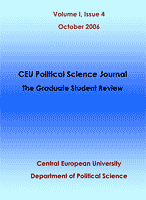Analyzing The Romanian Governmental Scene Theoretical And Methodological Difficulties
Analyzing The Romanian Governmental Scene Theoretical And Methodological Difficulties
Author(s): Alexandra IancuSubject(s): Politics / Political Sciences
Published by: Central European University (CEU) - Center for Policy Studies
Keywords: post-communist countries; Romania; “political bureaucracy”; coalition;
Summary/Abstract: This paper aims to emphasize some theoretical and methodological difficulties in analyzing post-communist countries through a case study concerning the professionalization of governmental elites and the development of decision-making procedures in the cabinets of postcommunist Romania. Are the existing theories applicable to the Romanian case? What methods can we apply in order to capture the function of government, and what are the limitations they imply? The paper will show that only a research design both quantitative and qualitative in nature can respond to the challenges raised by a post-communist country. The study is constructed on two main axes. The first one concerns an analysis of the governmental personnel and the decisionmaking process through quantitative methods, and the second axis concerns the same analysis, but from qualitative perspective. The last section of the paper presents a discussion about the research approaches, emphasizing the importance of a hybrid methodological research design in order to understand the Romanian case, as an image of the analysis of a transitional country.
Journal: CEU Political Science Journal
- Issue Year: 2006
- Issue No: 04
- Page Range: 38-64
- Page Count: 27
- Language: English

